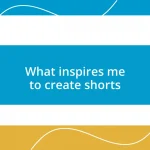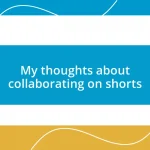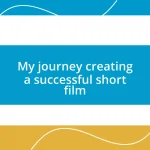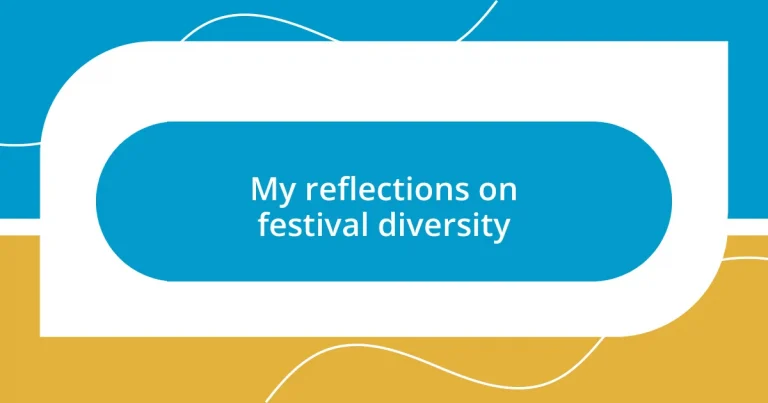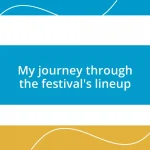Key takeaways:
- Attending diverse festivals fosters empathy and understanding by showcasing unique cultures and traditions, creating a richer shared experience.
- Cultural representation at festivals encourages inclusivity, breaks down stereotypes, and enhances collective understanding among communities.
- Future trends in festival diversity will likely include greater focus on technology for accessibility, sustainability, and mental health, enriching overall festival experiences.
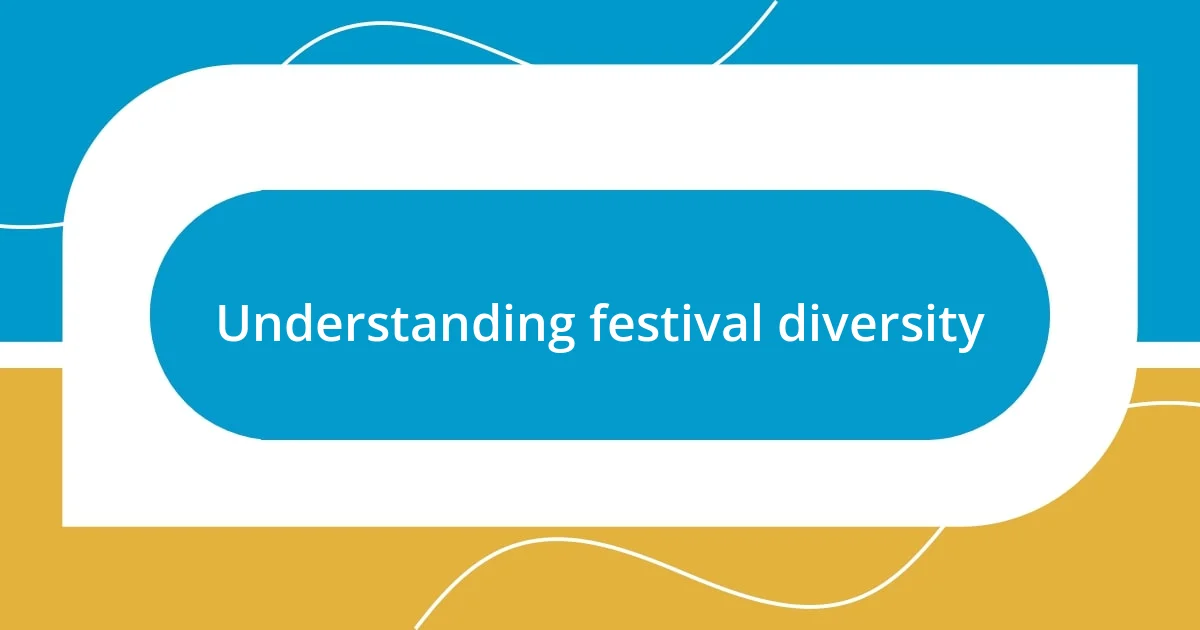
Understanding festival diversity
Understanding festival diversity is an enriching journey that spans across cultures and communities. I’ve always been fascinated by how different festivals celebrate unique traditions and stories—it’s like getting a glimpse into the souls of those we share our world with. Have you ever stood in the midst of a vibrant parade, feeling the beat of drums that resonate with a community’s history? That connection is palpable, reminding me of my own experiences at the colorful Diwali celebrations, where the air was thick with joy and the scent of sweets.
Each festival, with its unique customs, not only commemorates historical events but also serves as a powerful platform for cultural expression. I remember feeling a deep sense of belonging at an Eid celebration, surrounded by laughter, food, and shared prayers. It made me ponder: how often do we take the time to explore the diverse backgrounds of those we’re with? Understanding festival diversity can lead to a richer appreciation of our shared humanity.
When we embrace the diversity of festivals, we unlock a treasure trove of perspectives that challenge our worldviews. I often reflect on how attending a local powwow profoundly broadened my understanding of Indigenous cultures. The vibrant regalia, the storytelling, and the communal spirit opened my eyes to the beauty of resilience. Isn’t it fascinating how a shared experience can bridge gaps between different cultures, fostering empathy and understanding?
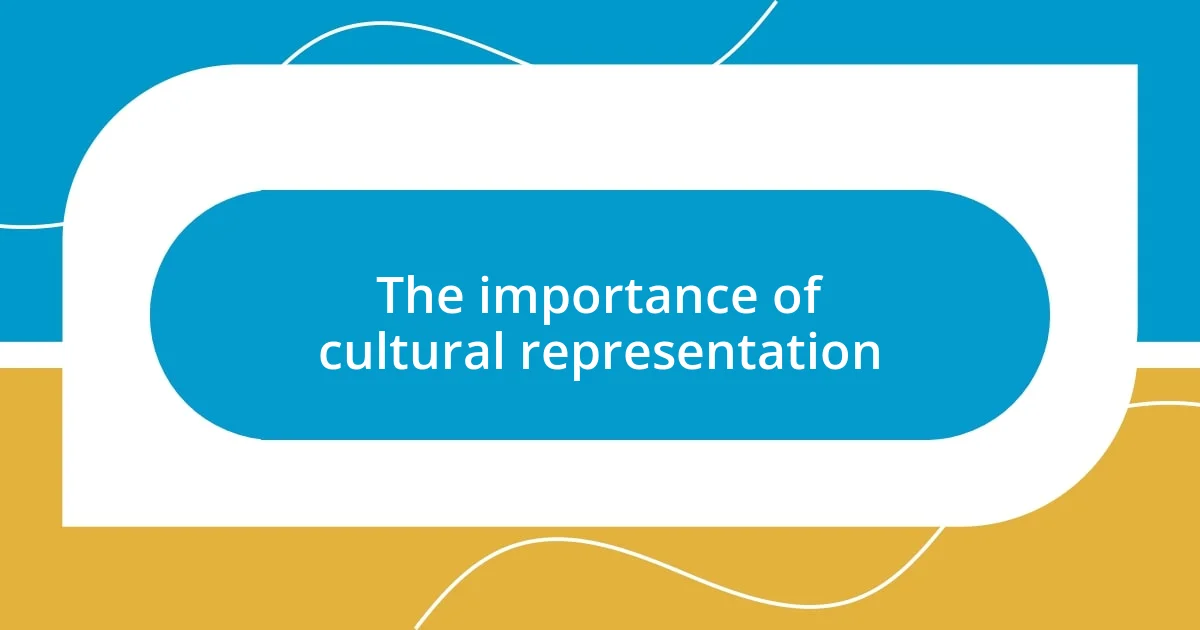
The importance of cultural representation
Cultural representation is vital because it fosters a sense of belonging for marginalized groups. I recall attending a Lunar New Year celebration where the colorful dragon dance and the sound of firecrackers filled the air. Seeing my friends from different backgrounds unite in appreciation of another culture made me realize how representation encourages inclusivity and understanding.
Moreover, festivals that highlight cultural diversity create platforms for conversations that can break down stereotypes. I remember a weekend spent at a Caribbean carnival. It was more than just a party; it sparked dialogues about identity, heritage, and the shared experiences that unify us all. Such interactions can challenge preconceived notions and lead to meaningful connections between diverse communities.
Ultimately, the importance of cultural representation in festivals extends beyond mere celebration; it actively contributes to the social fabric of our societies. When I see children from various backgrounds dancing and enjoying themselves together at a multicultural festival, I feel a glimmer of hope for a future enriched by diversity. Art and tradition serve as bridges that enhance our collective understanding and acceptance of one another.
| Aspect | Impact of Cultural Representation |
|---|---|
| Belonging | Encourages inclusivity for marginalized groups |
| Dialogue | Breaks down stereotypes through conversations |
| Unity | Enhances collective understanding and acceptance |
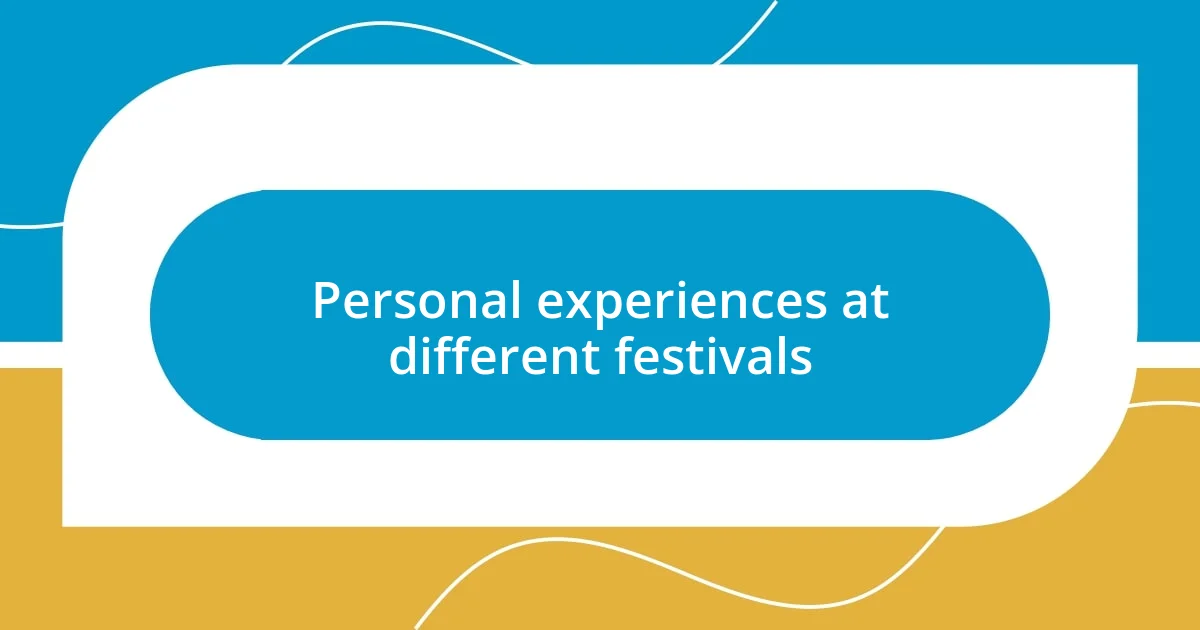
Personal experiences at different festivals
Experiencing festivals has always filled me with a sense of wonder. One year, I attended the Holi festival, and I can still remember the sheer joy of being covered in vibrant colors as laughter and music surrounded us. It was intoxicating—every splash of color ignited a connection beyond words.
- I’ve tasted delicious traditional foods that represent each culture’s history, like tamales during Día de los Muertos, which made me appreciate their significance more deeply.
- The dance performances I witnessed, particularly at the Greek Festival, brought stories to life and transcended language barriers, leaving me in awe of the shared human experience.
- Celebrating at the Pride Parade, I felt a profound sense of solidarity as everyone rallied for love and acceptance, showcasing the power of community and diversity in action.
In my experience, attending smaller, community-oriented festivals often brings unexpected joy. Last summer, I found myself at a local folk music festival, where I engaged in impromptu jam sessions with strangers who became friends. The atmosphere buzzed with creativity, and it reminded me how festivals can spark connections that might otherwise never happen.
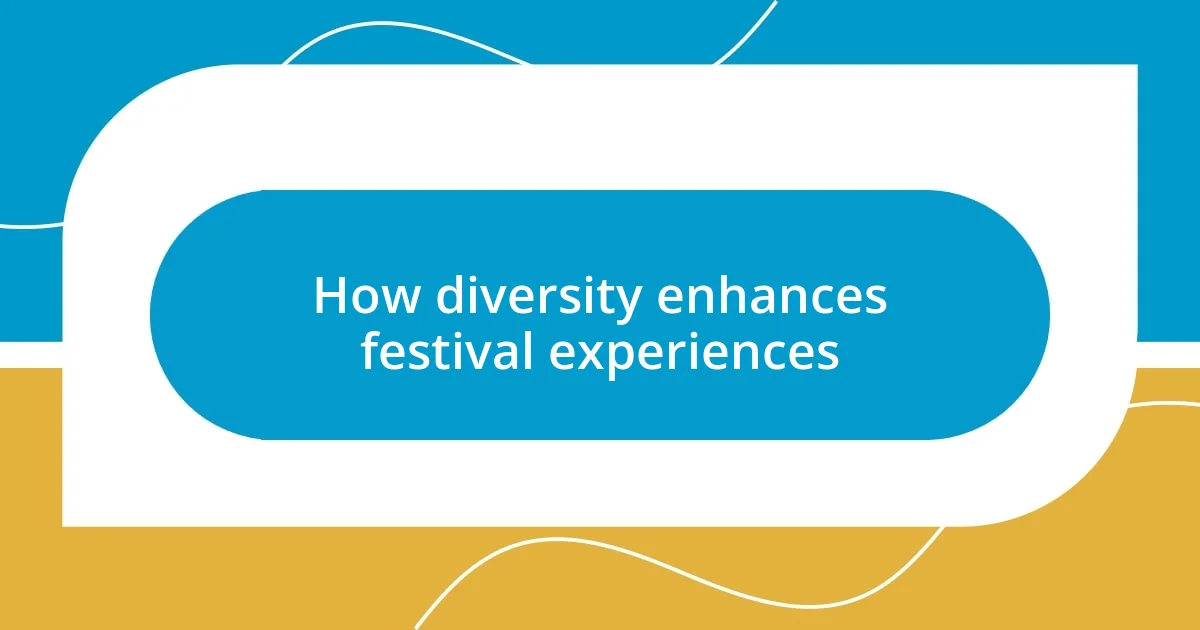
How diversity enhances festival experiences
One of the most profound aspects of diverse festivals is the unique experiences they offer, allowing each attendee to share in the joy of multicultural expressions. I vividly remember attending an Eid al-Fitr celebration where the atmosphere was filled with laughter and the enticing aroma of delicious food. Everyone, regardless of background, gathered to enjoy the festivities, highlighting how diversity creates a richer festival experience that nurtures connection and empathy among strangers.
Participating in a festival showcasing various dance forms was a true eye-opener for me. I found myself mesmerized not only by the performances but also by the stories they told. It led me to wonder—how much can we learn about each other through movement? Each twirl and leap held cultural significance, fostering a deeper appreciation for traditions outside my own, and demonstrating how diverse artistic expressions contribute to a more complete understanding of humanity.
Moreover, the addition of diverse perspectives at festivals encourages creativity and innovation. At a cultural fusion event, I watched as musicians from different backgrounds collaborated on stage, blending genres in an exhilarating way that thrilled the audience. It made me think about how diversity fuels artistic collaboration—not just benefiting the artists but enriching the festival experience for everyone present. Being part of that crowd, I felt an overwhelming sense of joy, knowing we were all witnessing the beautiful power of shared experiences.
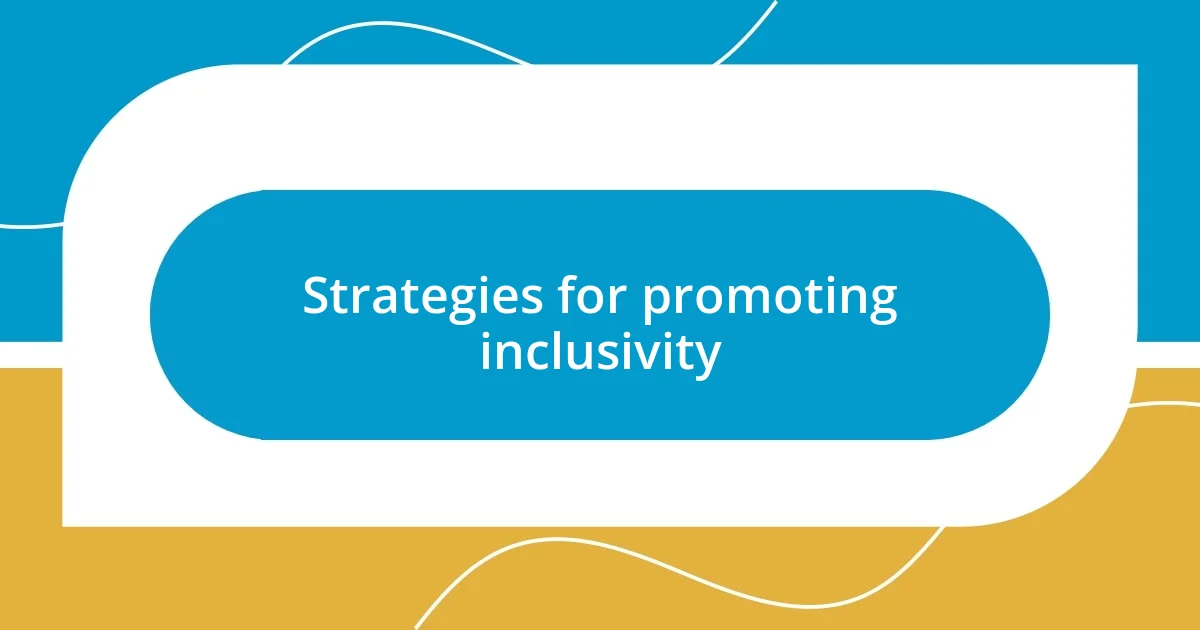
Strategies for promoting inclusivity
Promoting inclusivity at festivals requires intentional strategies to engage all attendees. I’ve found that creating spaces for open dialogue about diverse experiences can foster connections. For example, at a multi-ethnic festival I attended, organizers set up a “story corner” where individuals could share their cultural narratives. This simple addition sparked thoughtful conversations and built bridges between people from different walks of life.
Another effective strategy is to actively involve underrepresented groups in the planning process. During a local arts festival, I saw firsthand how artists from diverse backgrounds collaborated on promotional materials. Their authentic voices and unique perspectives not only enhanced the festival’s offerings but also attracted a broader audience, making everyone feel seen and valued. Isn’t it fascinating how inclusion in decision-making can elevate the entire event?
Lastly, accessibility is crucial in promoting inclusivity. I remember being at a jazz festival that made special accommodations for attendees with disabilities, such as designated viewing areas and sign language interpreters. These thoughtful touches demonstrated care and respect for all participants, leading to a more enjoyable and enriching experience. Wouldn’t it be wonderful if every festival prioritized accessibility in this way, ensuring that everyone can share in the celebration?
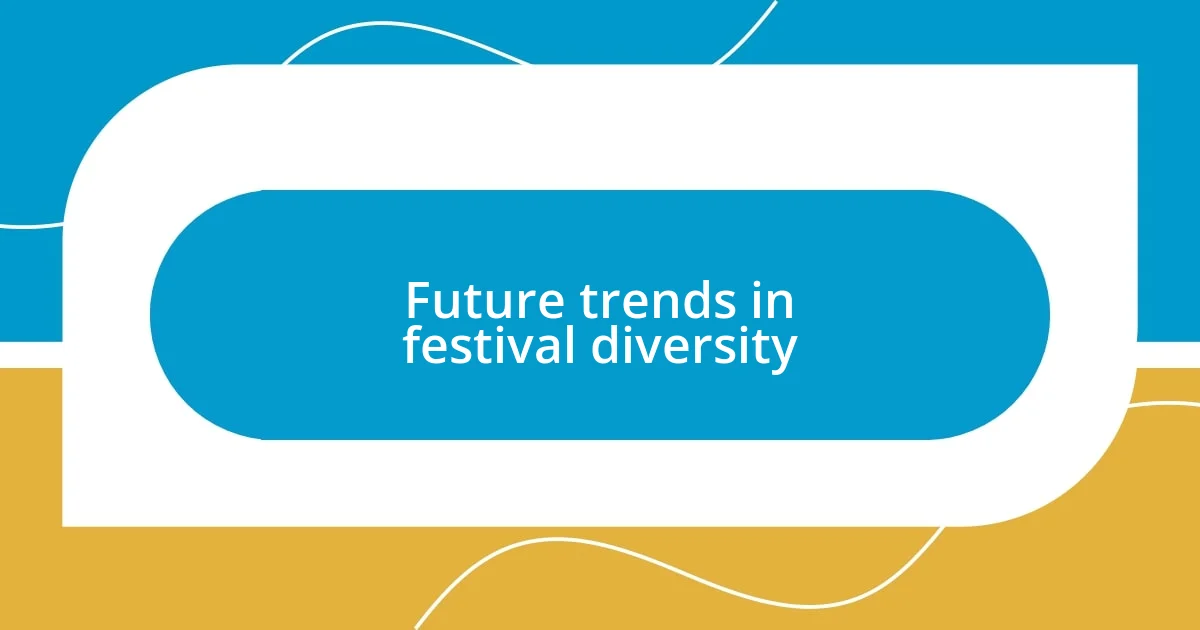
Future trends in festival diversity
I see exciting trends emerging in festival diversity that reflect our evolving society. One personal experience that stands out to me is attending a virtual cultural festival during the pandemic. It was incredible to see how technology brought together participants from all over the world, allowing them to share their traditions from the comfort of their homes. This shift not only expanded accessibility but also fostered global conversations that we might not have had otherwise. Isn’t it intriguing how digital platforms are reshaping how we experience cultural celebrations?
Looking ahead, I believe festivals will increasingly embrace sustainability as a core principle. At a local eco-friendly festival I attended, I was deeply moved by the organization’s commitment to minimizing waste and showcasing sustainable practices. From vendors using biodegradable materials to community workshops focused on environmental awareness, it created an atmosphere of collective responsibility. Could this become a standard expectation, with festival-goers choosing events that align with their values? I think so.
Moreover, as we move forward, festivals will likely prioritize mental health and wellness alongside cultural diversity. I remember feeling a genuine sense of calm and connection during mindfulness workshops held at a wellness festival I attended. They integrated cultural practices from various traditions, promoting holistic well-being. I can envision future festivals creating nurturing spaces among the vibrancy of cultural celebrations—might this balance of festivity and mindfulness redefine our experiences? I genuinely hope it does, as it could lead to deeper emotional connections and healing through shared experiences.



